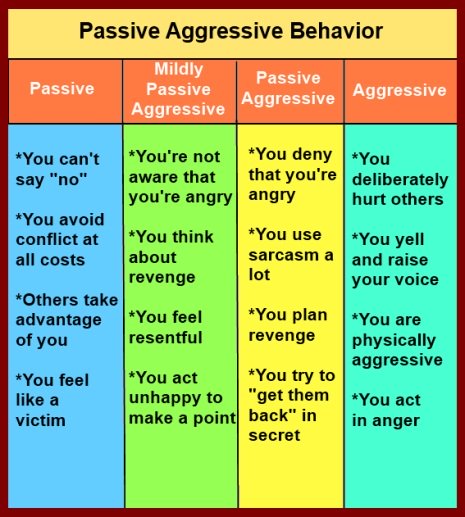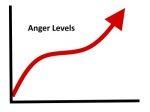Passive Aggressive Behavior
Straight From The Problem To The Solution
Authored by William G. DeFoore, Ph.D.

Passive aggressive behavior results from not being honest, with yourself and/or others. But that doesn't make you a bad person--most people are indirect with their anger at one time or another.
We're going to look at a good definition of the problem here, but then we're going straight to the solution! Dwelling on problems doesn't do anybody any good, but learning about and implementing solutions helps everybody!
Awareness is the first step to change, so let's first find out exactly what we're talking about when we say passive aggressive behavior. Take a look at the chart below.

What Is Passive Aggressive Behavior?
One of the reasons you fall into this type of pattern is that you're trying not to be overtly aggressive. And that's because you're a good person.
We're going to approach this problem in terms of the solution. But first, let's get on the same page about what it is--at least let me tell you what I think it is, based on my 40+ years of professional experience. I'll give my definition of passive aggressive behavior in these points:
- It comes from not knowing or not being comfortable with how you really feel.
- So you pretend you don't feel that way--we're talking mostly about anger here, but there's also some pain and fear in there.
- But you really do feel that way, and you have good reasons for it. So the feelings don't go away.
- This is 85-90% subconcsious, and most behavior is subconsciously driven. So, out come the feelings in the form of:
- Sullenness
- Pouting
- Sarcasm
- Cynicism
- Criticism
In other words, you feel angry about something but instead of expressing it you stuff it. But the anger doesn't go away, and it looks for a way out. It finds a way out through your behavior, while in your mind you are pretending that you're not angry.
What you're likely to hear from someone with this problem:
- "I didn't mean anything about it."
- "You're too sensitive."
- "I was only kidding with you."
- "Don't take it so personally."
Okay, but can this get really mean? You bet. Some people can't harbor such resentment and hostility that they really intend to hurt somebody. In advanced forms, this would be and example of passive aggressive personality disorder.
In my experience, however, this is rare. Most of the time, this kind of sideways, indirect anger comes from basically good folks who just don't know any other way of getting their feelings out.

How Do I Deal With Passive Aggressive Behavior?
If it's you with the problem...
First, I'll say congratulations for being here and trying to get emotionally healthy! You can learn to express your emotions in healthy, straight-forward ways instead of being indirect and passive. Here is what I recommend:
- Know your own story. Take a look at your personal hot buttons, because that's where your anger, fear and pain are the strongest. These journaling exercises will help you with that.
- Take responsibility for your own emotional healing, but doing the second journaling exercise will help you move your anger from your subconscious to your conscious mind where you can better manage it.
- Use the power of imagery to further heal your emotional wounds and diffuse your anger.
- Next, use the positive journaling techniques (third step in the link above) to start training your mind to look at what is good, right and working in your life and your relationships.
- And finally, learn communication skills for conflict resolution and communicating anger in healthy, respectful ways.
Do the above exercises, and you will most definitely get some benefit. Do them regularly, and you will feel yourself changing. Do them regularly on an ongoing basis, and you will start to live a happy, productive life with positive, loving relationships.

If you're in a relationship with a passive aggressive person...
Be sure and look through the above material, and make sure that you are clear about your own emotions. Then try some of these approaches:
- Learn about empathy and reflective listening, which are described in the communication skills link below. These can sometimes be helpful in dealing with indirect or sideways anger.
- Try these communication skills for conflict resolution, and see if your friend or partner is willing to try them with you.
- Focus on the positive aspects of the other person. Use the positive journaling exercises to help you with that. Sometimes, when you believe the best of someone, they will start to change right before your eyes.
- Stay focused on yourself and your own chosen direction. You are 100% responsible for yourself, your choices, your emotions and the actions you take. Make decisions on that basis of the good person you know you are inside, and you can't go wrong.
P.S. The best thing you can do regarding passive aggressive behavior is is to make sure your own anger is healthy. All of these products are designed to help you become your own best anger management resource!
- Home
- Heal Your Relationships
- Passive Aggressive
We receive commissions on Amazon sales on this website.






New! Comments
Have your say about what you just read! Leave me a comment in the box below.